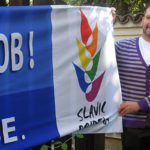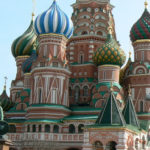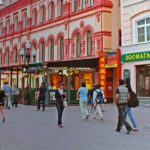Introduction
Gay Russia is a vast subject with a short modern history. Life is not easy for LGBT Russians and most prefer to remain in quiet safe closets. But three LGBT organizations are challenging the old traditions and attitudes. It is not easy or always safe but the challenge is great and their determination is strong.
By Richard Ammon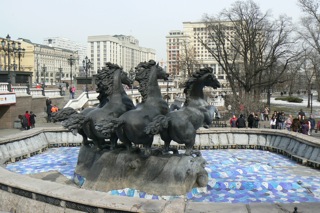
GlobalGayz.com
Updated 2018
Note: This is a long report covering gay life in Moscow
and Saint Petersburg. The major sections are:
Finding the Scene–overview
Gay History–from 1700’s to present
Saint Petersburg–gay scene
Activist Groups–three organizations
Moscow–gay scene
A brief comment from 2018 sent by an activist in Moscow:
“As for me personally, I am doing well, job and home, that’s all my life. As for community, it remains underground now. Almost all its events are doomed to be held behind the closed doors and with passport control. Because of Putin’s anti-propaganda law, all LGBT events can be accused of being gay propaganda especially if any minor person might appear there.
Yet, even such a cautions don’t protect LGBT activists from attacks. Last week in Saint Petersburg opened LGBT a cinema festival ‘Side by Side’. The ceremony was behind closed doors, however the member of city parliament Vitaly Milonov, notoriously known for his aggressive homophobia, came there, and stood in front of the doors with his assistants, hooligans and cameras, demanding to stop the festival.
In the end of last year in Moscow we secretly opened a LGBT community center, just a couple of rooms, without any special signboard, very modest. Every week groups of LGBT people gather there for social contact. In the other room there is a MSM health service where one can get tested for HIV. That’s all news so far.
“As for Alexeyev, he is not going to flee from Russia. The point is that his civil partner is Swiss (and French) citizen. They live together about 15 years. And Alexeyev had opportunities to become Swiss citizenship many times before. However he refused many times. Now he sees that political situation in Russia is becoming worse and worse every day. Last year he was jailed for 10 days by court for participation in banned gay rally. So I guess that he would like to receive some legal safety as a foreign citizen in the future. It doesn’t mean that he will leave Russia for good. No. He will live in Russia like before. The Swiss citizenship is necessary for him just as a kind of some security from legal prosecution by Russian authorities in the future. That’s my opinion.”
Finding the Scene
It’s not easy for an outsider to get a proper take on the LGBT ‘scene’ in Russia. This vast country of eleven time zones stretches more than ten thousand kilometers—6300 miles—from Western Europe to far eastern Vladivostok.
As the world knows, the Russian Duma (parliament) fast-tracked an anti-gay propaganda law before the Sochi Olympics to stifle any LGBT demonstrations during the games. It is a pathetic, bigoted law that blatantly discriminates against the rights of LGBT Russians. It is a sign of the times there as repression has regained a strong foothold and many–not all–LGBT activists have receded back into their closets. See interview with activist Nicolai Baev for more.
Several years ago we took the Trans-Siberian Railroad from Mongolia westward through Siberia to Yekaterinburg and back to Vladivostok. Except for closeted individuals and some secretive gay friendship circles in the large cities such as Irkutsk (population 600,000), Krasnoyarsk (1 million), Novosibirsk 1.5 million), Omsk (1.2 million) and Yekaterinburg (1.3 million) and Vladivostok (600,000), a visitor will find no signs of homosexual communities in this huge area that makes up about 77% of Russia’s territory (13.1 million square kms–5 million square mi). Only 25% of Russia’s population lives here.
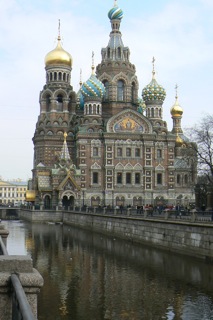 In contrast, Russia’s two major western cities, Moscow (10.5 million) and St. Petersburg (4.6 million) are home to Russia’s visible gay community but even here the LGBT presence is miniscule. (photo below: Church of the Spilled Blood, St. Petersburg)
In contrast, Russia’s two major western cities, Moscow (10.5 million) and St. Petersburg (4.6 million) are home to Russia’s visible gay community but even here the LGBT presence is miniscule. (photo below: Church of the Spilled Blood, St. Petersburg)
Gay travel magazine Passport reported on St. Petersburg in April 2010 with an entertainment piece describing the pretty palaces, impressive churches and the great Hermitage art museum. These descriptions are followed by comments about the gay club scene.
The story is useful if one is there for a few touristic days and a few hours for drinking, dancing or dark rooms. But this is hardly an accurate portrayal of gay life in St Petersburg or Russia. What the journalist, Bill Strubbe, chose to see was an after-dark and behind-closed-doors’ peep show of a virtually invisible gay life that is kept well hidden from public daytime view. Even the most popular club in St, Petersburg, Central Station, doesn’t open until 10 PM. And the author did not appear to seriously interview a single gay person (which I can appreciate since the language barrier is a serious issue).
Gay History (briefly)
Looking for more ‘pulse’ of LGBT life in Russia takes some digging, online research and interviewing of LGBT Russians since a casual visitor will see no visible signs of what gay life is like here.
As one reads the history of the gay movement–or rather gay ‘effort’ since no wide-spread movement has ever emerged in Russia—one sees a fragmented story of occasional unsuccessful efforts to organize in a hostile socialist environment or, since the fall of the Soviet state, in a decidedly homophobic society.
In his overview of Russian gay life, ‘An Approach to the History of Sexual Minorities in Russia’, Alexander Kondakov, a university social scientist in gay studies, describes the usual persecution of homosexuals under the various tsars dating from the 15th century’s Ivan the Terrible through rumored bisexual Peter the Great. (Many believe his close advisor Alexander Menshikov was also his lover). Punishment for sodomy was usually imprisonment or exile.
Catherine, the Great (gay-friendly) Exception
The only respite from such punitive laws was during the 34-year reign of Catherine the 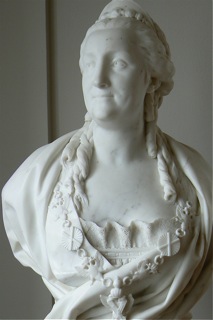 Great (ruled 1762-96; photo right). She was the most enlightened and politically shrewd monarch in Russian history bringing in scholars, philosophers and thinkers of the Enlightenment such as Denis Diderot, Voltaire and Montesquieu from western Europe to her court.
Great (ruled 1762-96; photo right). She was the most enlightened and politically shrewd monarch in Russian history bringing in scholars, philosophers and thinkers of the Enlightenment such as Denis Diderot, Voltaire and Montesquieu from western Europe to her court.
She was apparently influenced much by Diderot who believed that “nothing that exists can be unnatural or perverted” (She was a contemporary of Frederick the Great, the enlightened ‘gay king’ of Prussia who ruled from 1740–1786.)
The Hermitage Museum of art, which now occupies the enormous Winter Palace, began as Catherine’s personal collection. She also wrote plays, fiction and memoirs. Her influence laid the groundwork for the great writers of the nineteenth century, especially for Alexander Pushkin, and her patronage of Russian opera helped bring it to world-class status.
During her time statutes punishing voluntary homosexual relationships were canceled on her instructions. A bit of reading reveals that she was a highly sexual woman who believed in the freedom to love and have sex with attractive men (married or not), of whom there were more than a few. No doubt such thinking casts her as a woman way beyond 18th century Russia in whose eyes the freedom to love included same-sex attractions and feelings.
Unfortunately her time passed and Russia went back to it long-standing homophobic traditions–not that they wholly disappeared under her rule.
A hundred and fifty years later, in 1917, the Bolsheviks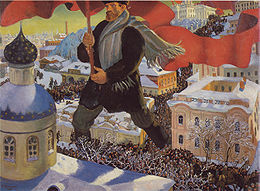 abolished the Tsarist penal code that left homosesuality in limbo–not illegal under the new laws. But soon enough under Stalin in 1934 homosex was definitely criminalized. Sixty years later, in 1993 was it decriminalized, one of the conditions of joining the Council of Europe. In January 1999 homosexuality was excluded from the list of mental diseases and its treatment and diagnostics were officially ceased, but is still today considered a ‘deviation’. (photo left: Boris Kustodiev’s ‘Bolshevik’ 1920)
abolished the Tsarist penal code that left homosesuality in limbo–not illegal under the new laws. But soon enough under Stalin in 1934 homosex was definitely criminalized. Sixty years later, in 1993 was it decriminalized, one of the conditions of joining the Council of Europe. In January 1999 homosexuality was excluded from the list of mental diseases and its treatment and diagnostics were officially ceased, but is still today considered a ‘deviation’. (photo left: Boris Kustodiev’s ‘Bolshevik’ 1920)
So it is no surprise that homophobia (internal and external) runs high in Russia. After five or six centuries of persecution, it has been less than 20 years since the law changed and activists have been pushing against the tradition of rough discrimination, ignorance and bigotry of tsarist and Soviet rule.
Gay Pride has barely begun in Russia. The lack of a strong ‘community’ is also not surprising given the reluctance of most LGBT Russian people to come out publicly from behind their own fear. The modern idea of a distinct gay identity does not appeal to many Russians. One gay man said “activism occurs here because Westerners put Russians up to it. My good friends know I am gay, but it’s my private business. I’m not interested in telling everyone that I like to sleep with men.”
Another informant added: “I don’t want to be part of a subculture. I know that’s the fashion in the West, but though I may choose to sleep mainly with gay men that doesn’t mean I want to socialize primarily with them.”
That means, if you want to socialize with your straight friends and not be considered an deviant person, keep your mouth shut and don’t come out and especially don’t advocate for change or equal rights. Archaic as this may sound to the Western ear, it is very much a controversial issue among gay Russians in 2010.
Coming Out in Saint Petersburg
St Petersburg is generally felt to be ‘softer’ than Moscow regarding LGBT issues, although this does not mean it’s tolerant in the Western European sense. There are half a dozen popular and trendy gay venues, including the most energized disco, situated literally in the shadow of the great Kazan Cathedral. 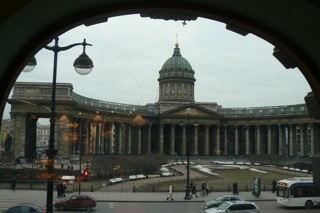 (photo right)
(photo right)
But the scene is not limited to the night. A small group of LGBT activists, GayRussia.ru is the leading LGBT rights activist organization in Russia today. I met with two members, Maria and Sasha, at the opulently art deco Singer Cafe on Nevsky Street in central St Petersburg one afternoon for coffee.
Maria, a coach for people with speech disorders, is a cheerful enthusiastic GayRussia.ru member who had just returned from an organizational meeting in Moscow with Nicolas Alexeyev the chairperson of GayRussia.ru and other activists. Sasha is a 20-year old student in his fourth year at the St. Petersburg State University (“one of the best”) studying public administration. Maria is comfortably ‘uncoupled’ and Sasha has a boyfriend in Moscow, about 800 kms (430 miles) away.
Both are out to their parents who were upset at first but who came around to present attitudes that “it’s your choice… we want you to be safe and happy.”
(Also see this thoughtful commentary about modern attitudes toward gay parenting, coming out and tolerance in St. Petersburg.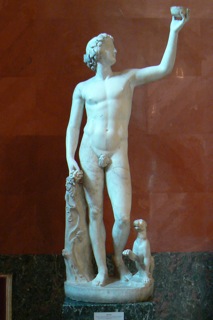 )
)
(photo left Hermitage statue)
One of the reasons why Maria thinks St Petersburg is softer is because their group has been more hidden and have not gone into battle—so far–with the local government over LGBT issues or events. Despite the presence of several gay venues in St Petersburg GayRussia.ru skirts around the authorities with its activities.
However the recent 2012 anti-gay statute banning any public ‘propaganda of homosexuality’ has made their public work virtually impossible. A similar anti-gay law was passed by the federal government for all of Russia in 2013.
The group mounts a yearly (indoor) film festival in the city; despite the ban an occasional brief rally against homophobia is occasionally held on a side street not far from Kazan Cathedral. In the past such small events usually happened without incident but now there is increased risk of arrest. GayRussia.ru local activists and international supporters are sometimes able to outsmart the police and perform a stealth ‘flashmob’ Pride demonstration with flags, banners and brochures for a short while then dispersing before the police arrive. So far no one has been arrested or bashed, but the threat is ever-present.
In Russia people have the right to assembly; the authorities don’t have the power to ban most events outright but they can procrastinate or make delaying excuses for not issuing a permit. But with the new law any LGBT requests will be denied.
Maria and Sasha (photo right) agree “we activists are considered ‘radicals’ even by most of our own LGBT community. They think we are trying to annoy people and we should stay in the closet. They don’t understand the higher principles of equal rights we are entitled to–that all Russians are entitled to. They want to accept that we are not equal.” 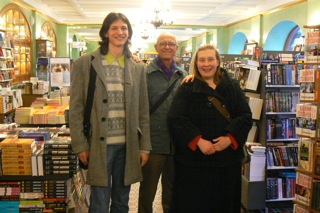
In addition to GayRussia.ru there are two other LGBT associations in Moscow and St. Petersburg. See ‘The Activists’ section below.
Raising consciousness and visibility was in the past the story each year for the past several years since GayRussia.ru started gay Pride in 2006 in Moscow. In 2010 an attempt was made to hold the first Pride festival for St. Petersburg. Needless to say it did not get any support other than a few friends.
Maria had planned to keep that Pride event quiet and low-key but word got out and opposition mounted. One local St. Petersburg parliament member expressed his opinion that homosexual relations in Russia should be criminalized, and gay Pride should be prohibited. “If gays still decide to hold an unsanctioned rally in St. Petersburg,” according to the deputy, “it will be necessary to arrest them and bring them to justice.”
Before the anti-gay law, St. Petersburg human rights ombudsman Alexey Kozyrev said gay Pride parades could be conducted in St. Petersburg. Even the predicted failure brought attention and publicity to gay St. Petersburg. (Also see this report of a new St.Petersburg group named ‘Coming Out.)
Anti-homophobia Rally
The day after we met Maria and Sasha (2010) they participated in a local anti-homophobia rally in central St. Peterburg (photos right and left) wearing 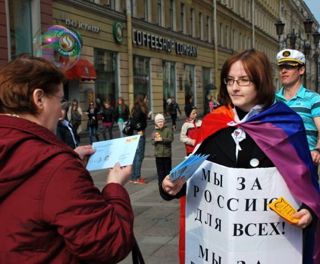 rainbow flags over their shoulders, carrying signs and handing out brochures that read: “Thus we express our civic right: homophobia is inadmissible. We urge city authorities to struggle with it.
rainbow flags over their shoulders, carrying signs and handing out brochures that read: “Thus we express our civic right: homophobia is inadmissible. We urge city authorities to struggle with it. 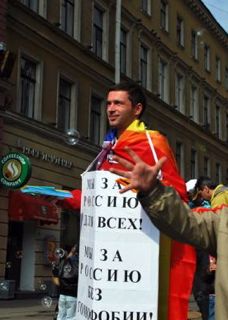 Support us–send a Rainbow letter to a city administration with the question: how does it deal with a homophobia?”
Support us–send a Rainbow letter to a city administration with the question: how does it deal with a homophobia?”
The rally was part of Russian LGBT Network’s weeklong anti-homophobia campaign during which they met no resistance, partly because the events were calm and small. The week closed with a day festival of lesbian poetry and songs in a club.
Some Venues in St. Petersburg
Passport magazine writer Bill Strubbe did more bar hopping than GlobalGayz usually does. Here are a few of the venues in St Petersburg according to him.
Dali’s, which GlobalGayz did visit for two minutes then left nearly deaf from the very loud salsa music, is a small, cozy café and bar with blood red walls and surreal touches. The waiter (a university student by day) laughed when asked if there was anything like a gay student club or organization at his college—an absurd notion.
“Central Station Club is on four levels connected by several stairways, a half-dozen bars, two stages, a sushi restaurant, comfortable nooks to chat in, and a dance floor. Sergey the manag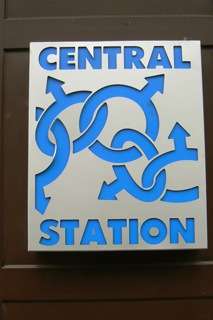 er explained that the security staff watch out for thugs waiting to attack people leaving the club late at night.”
er explained that the security staff watch out for thugs waiting to attack people leaving the club late at night.”
“Greshniki (Sinners), three floors in an old mansion with a faux-dungeon ambiance (leather and chains) and a decadent, carnival-like scene.”
“Cabaret, located in the former Soviet Palace of Culture near the Baltic railway station”
“The smaller Mono offers a more intimate alternative with an older, friendly crowd.
Regarding the presence of gay venues in the city, Maria had this to say: “our homophobic authorities use this argument against us: ‘There is no discrimination of LGBT people in Russia. You have gay clubs’—they just don’t get it”.” Just don’t say anything in public.
The Passport story concluded: “While there is some increase in personal freedom, and entrepreneurial initiatives are certainly a boon for many in the new Russia, the life of the average person in the countryside has changed little. Meanwhile, the Soviet social safety net that once existed has been irrevocably torn away, leaving the poor and elderly to fend for themselves.” Many babushka women sell flowers or vegetables on the street corners.”
(A Room With a View)
GlobalGayz almost never recommends places to stay, but as an antidote to the expensive hotels suggested by Passport magazine, we stayed at the Pio B&B for only $85 a night for a double. They have two locations in the city. Nice clean modern digs.
The Activists
So who’s doing all the pushing and shoving to stir up trouble with the authorities and continuing the struggle for LGBT human rights in Russia today?
There are three LGBT groups in Russia: GayRussia.ru, Gay.Ru and the Russian LGBT Network.
(1) GayRussia.ru was founded in 2005 and is the main activist leader ‘pushing and shoving’ for gay rights in Russia. GayRussia.ru have no physical office space (they meet at members’ homes) but it is a busy ‘place’ nevertheless. Under the leadership of fearless Nikolai Alekseev, Anna Komarova and Nikolai Baev and about 30 others, GayRussia.ru has become a player on the world stage of gay rights. Their most ‘notorious’ action is the annual mounting of Moscow Gay Pride in May, which has been banned each year by the mayor. 
As a full member of ILGA (International Lesbian and Gay Asssociation), GayRussia takes part in the regional and world conferences of the organization; they are the official coordinator of the “International Day Against Homophobia” in Russia; they submit legal cases against discriminatory agencies, government or private. In a landmark case, they succeeded in getting the ban on ‘gay blood’ donations overturned in 2007.
On their extensive website, with an English version, they report “due to the lack of serious queer information in Russia—especially for gay youth–we decided in March 2005 to create a new internet portal for the LGBT community. Our purpose was to offer something different than what was done before. From the very beginning, we decided to ban commercial activities and to focus on gay rights and advocacy. So, project GayRussia.ru was born.” www.gayrussia.ru.
GayRussia.ru have also published the first-ever gay map of Moscow and have participated in Western European Pride parades in Paris, Berlin and London.
They have organized the publication of two books, in Russian, about Oscar Wilde. They have also protested in front of the Iranian embassy in Moscow against gay murders; participated in the controversial Riga Pride events; sent representative to the OutGames Human Rights Conference in Copenhagen 2009; challenged the current law on Public Demonstrations for the last five years arguing in different cases of banned gay public actions that the law in its current form is not applied correctly by the Russian authorities; They offer LGBT social venues /clubs/bars on their website along with general cultural sites such as the Kremlin and Pushkin Museum. Their website offers insights into legal, political and religious life in Russia.
Over the last 3 years, the activists of GayRussia.Ru not only spoke against homophobia of Russian politicians, public and religious figures. They also conducted several legal campaigns to the European Court of Human Rights against officials and religious leaders such as the Mayor of Moscow (for his ban on gay Pride) and Mufti Talgat Tadjuddin (for his inflammatory anti-gay remarks). These are two examples among 200 court cases concerning legal and discrimination issues submitted by GayRussia.ru in recent years.
The visibility of the 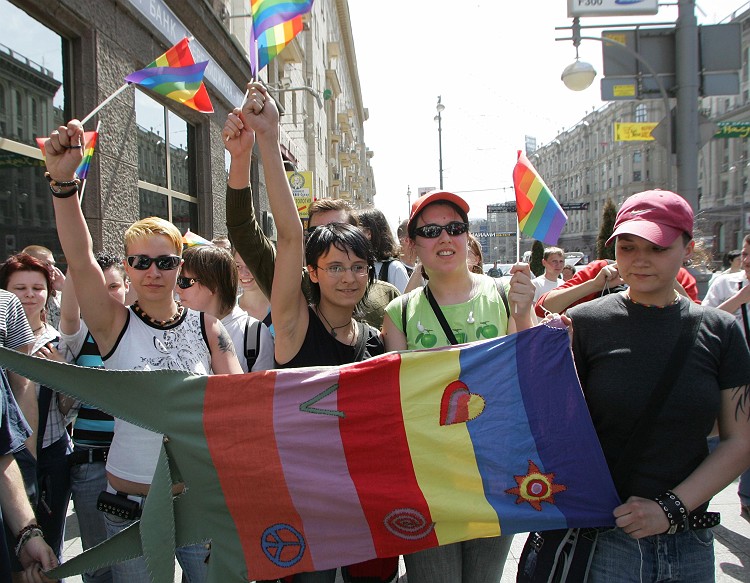 Russian LGBT community has increased, both locally and abroad. The conflict and confrontations around the Moscow Pride (photo left) has helped to attract attention of international participants and brought international media attention to GayRussia.ru and their work. More than one foreign supporter has had his nose bloodied in the tussle with police.
Russian LGBT community has increased, both locally and abroad. The conflict and confrontations around the Moscow Pride (photo left) has helped to attract attention of international participants and brought international media attention to GayRussia.ru and their work. More than one foreign supporter has had his nose bloodied in the tussle with police.
GayRussia.ru was featured in the gay documentary ‘Beyond Gay: The Politics of Pride‘ about the problems GayRussia faces each year in mounting Gay Pride. “The movie directed by Bob Christie is dedicated to the gay pride movements around the world. It emphasized the activity behind organizing gay prides, which often, are taken for granted by many activists in western countries while in other parts of the globe, such events are still banned.”
(2) Gay.ru was started in 1996 as an information and entertainment web site. They don’t deal with politics and are not affiliated with GayRussia.ru. Nowhere on their site is the activity of GayRussia.ru acknowledged (and vice versa).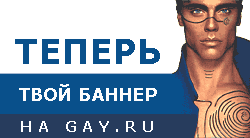
Gay.ru is not a real organization with meetings. On their site they offer articles in English and Russian including a lengthy history of homosexuality. “We made Gay.Ru a place where our gay, lesbian, and questioning visitors can find such vitally important information as psychological aspects of coming out, coping with homophobia, safer-sex techniques; read life stories of fellow gays and lesbians and receive a response to their questions.”
On their site they also announced a successful gay film festival (poster left) in Novosibirsk in April 2010. They list available gay guides in English to Moscow and St. Petersburg, a useful idea since a foreign visitor is easily lost because of the language barrier.
Entertainment and night life venues are listed but the reliability of the listings is uncertain since two of the listed places—Eros sauna and Body-and-Soul club—have both been closed for a while. 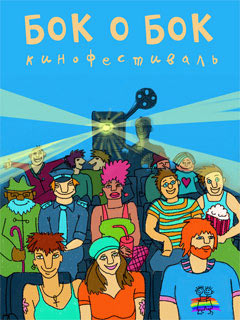
Gay.ru also has useful brief commentaries on gay life in Russia regarding politics (“gays and lesbians have not been allowed to voice out their concerns as a community, but also they dare not to be ‘out’ and behave naturally”); law (“legal status of Russian gays remains precarious; they are often subjected to abuse and harassment both by government official and fellow citizens.”); community (“apart from Moscow and St. Petersburg, there is no gay community in Russia or in any neighboring ex-republic of the former USSR society”); family (“Same-sex unions are not generally accepted in Russia… younger Russians now are fighting back”); religion (“the Orthodox Church still treats gays as depraved sinners who do not merit redemption”); history (“the official historiography has stonewalled the gay side of Russian social life”).
Also, bisexuality (“gays don’t accept them as ‘their kind’, don’t agree with the policy of ‘pleasing both’”); lesbians (“lesbian means deviation, period. So let us be the best naughty girls.”); trans people (“it should be added that both can be gay or straight”); art and culture (“great gay artists–what they had to go through in tough Russia to grant us the joy of their talent”); travelers guide (“our site features the most comprehensive list of gay venues in the ex-USSR.”); a Forum (mostly sex search listings), and online shopping (books mostly).
(3) Russian LGBT Network was organized in 2006 as a human rights monitoring association of LGBT people who wanted to bring rights violations to the public view as a way of non-activist education. It was formed in response to the worsening situation for LGBT people in Russia in 2004 and 2005. In their work they collaborate with the Moscow-Helsinki Group, which is Russia’s oldest and largest human rights group.
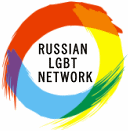
LGBT Network is based in St. Petersburg under its leader, Igor Kochetkov (Petrov). The have less of a presence in Moscow. LGBT Network claim to have 13 regional offices (Saint Petersburg, Tyumen, Pskov, Tomsk, Kemerovo, Omsk, Arkhangelsk, Perm, Volgograd oblasts, Khabarovsk and Krasnoyarsk krais, the Republic of Karelia, and Tatarstan).
LGBT Network feels strongly about people from the rural areas being included within the LGBT Network to learn how to organize and promote human rights. “They want to fight but don’t know how. The network’s most important task is to support and train them,” said Igor Petrov.
In response to this need, LGBT Network developed a human rights training course called ‘One Week Against Homophobia’ and was implemented. It has played an important role in giving rural gays the courage to organize and network with the larger Network in St. Petersburg.
In autumn of 2008, LGBT Network co-arranged with the Swedish-Helsinki Committee a large conference that was attended by about 100 participants from across Russia. The aim was to create alliances among human rights organizations. In addition to monitoring violations, LGBT offers a useful brochure titled ‘Domestic Rights for Gays and Lesbians in Russia’ (photo left) 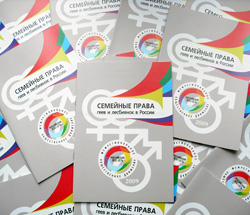 that discusses ways for gays and lesbians to create families with those whom they love. Actually, in the laws of Russian one can already protect relations, general interests and property of same-sex couples. The brochure is written by a lawyer specialized in civil law.
that discusses ways for gays and lesbians to create families with those whom they love. Actually, in the laws of Russian one can already protect relations, general interests and property of same-sex couples. The brochure is written by a lawyer specialized in civil law.
Another notable achievement of LGBT Network was somewhat ‘activist’, despite their disdain for face-to-face actions. In July 2009 a meeting between the Russian Federation Human Rights Ombudsman, Vladimir Lukin, and representatives from LGBT Network took place. During that meeting LGBT Network presented an extensive 40-page report titled ‘Discrimination based on sexual orientation and gender identity in Russia’ conducted by the Moscow Helsinki Group in cooperation with the Russian LGBT Network in 2007-2008.
It is a landmark report, the first specialized study of the legal situation of gays, lesbians, bisexuals, and transgendered people (LGBT community) in Russia. The report included an evaluation of the laws with respect to guarantees of non-discrimination and a sumary of identified facts of violation of rights and freedoms of people with nontraditional sexual orientation and gender identity.
Ombudsman Lukin expressed a positive attitude toward lesbians, bisexuals and transgender citizens and said they are entitled to same rights as all other people. “If rights of specific people are violated due to their orientation, we are ready to protect their rights.”
Also within the Network, there is an smaller organization is called “Vykhod” (Coming Out), one of their most important functions. Coming Out has an official registration from the Ministry of Justice as a legal entity, a very rare achievement for a LGBT associations in Russia, which are usually denied by authorities. Coming Out has real ‘activists’ (not the street variety like GayRussia.ru) in St. Petersburg, who are funded with money from abroad. The organization’s main goals are combating discrimination, defamation, and violation of rights, monitoring human rights compliance “in the sphere of gender relations” and in promoting gender equality in the society.
one of their most important functions. Coming Out has an official registration from the Ministry of Justice as a legal entity, a very rare achievement for a LGBT associations in Russia, which are usually denied by authorities. Coming Out has real ‘activists’ (not the street variety like GayRussia.ru) in St. Petersburg, who are funded with money from abroad. The organization’s main goals are combating discrimination, defamation, and violation of rights, monitoring human rights compliance “in the sphere of gender relations” and in promoting gender equality in the society.
Differences Between the Three Organizations
Each of these three Russian groups has a different focus and mode of operating. GayRussia.ru is in the streets with overt activism and does political lobbying. “We believe that our visibility gives us more chances to be accepted and tolerated by society and to gain our human rights.”
Gay.ru is moderate and doesn’t think that active visibility of gays is useful. They prefer offering quiet internet information about LGBT life issues and social activities.
Russian LGBT Network also does not demonstrate in any public actions. Instead LGBT Network operates quietly, organizing meetings, networking, producing brochures and publicizing rights violations to the larger world-wide human rights organizations.
Are the three organizations antagonistic to each other? “They were antagonists some years ago,” said Nikolai Baev of GayRussia.ru. “There was a battle of issues on both sites in 2006 and 2007, as we started the Gay Pride movement in Moscow. GayRussia.ru was criticized by Gay.ru for such a politics and we accused them of passivism and collaborating with homophobic authorities. Now both sides (activist vs inactivist) just ignore each other, and try to be neutral. They entertain, we keep fighting.”
Cruising Through (Part of) Gay Moscow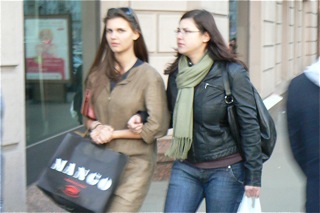
I had arranged a walking interview with Nikolai Baev, a leading activist with GayRussia.ru and we strolled around the fashionable Tverskaya Street area where mostly straight trendy shops, cafes and bars are found. New money in Moscow means designer coffee and being seen in high fashion.
The feel of Moscow is different from St Petersburg. Moscow is a ‘hard’ city that moves fast; business is brisk for the small but prosperous middle class that has emerged since 1989. BMWs race around town for the lucky few while the other 8 million riders use the vast subway system.
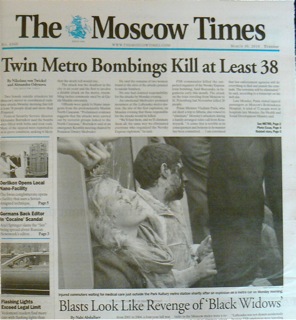 There is an edge of intensity in the visible and invisible here. During our weeks (in 2010) in the city there were two (same-day) terrorist subway suicide bombings that killed about 40 people. (We missed being victims of one of the bombs by 15 minutes as we walked to the subway.) (photo left)
There is an edge of intensity in the visible and invisible here. During our weeks (in 2010) in the city there were two (same-day) terrorist subway suicide bombings that killed about 40 people. (We missed being victims of one of the bombs by 15 minutes as we walked to the subway.) (photo left)
The next day a famous senior human rights activist. 88 year-old Lyudmila Alexeyeva who founded the country’s oldest rights group Moscow-Helsinki Group, was mysteriously assaulted as she laid flowers at the subway victims’ memorial. A few days later a Moscow city court judge was murdered in his apartment building because he sentenced right-wing nationalists to long prison terms for their violent crimes against immigrants.
Separately, the most senior living Russia diplomat, Anatoly Dobrynin, longtime ambassador to Washington, died at the age of 90 in Moscow. On the upside, the following week Obama and Medvedev signed a nuclear arms treaty.
Then a few days later the President of Poland and his large entourage of ninety Polish officials were all killed when their plane crashed in eastern Russia as they were arriving to memorialize a World War II massacre.
It was indeed an intense three weeks—not to mention the major frustration of not understanding or reading Russian. Cyrillic letters are not easy for a visitor and there are very few signs in English.
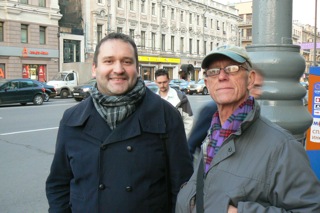
Continuing with Nikolai
Nikolai, 35, is a lovely bear of a man, with a stylish light beard and moustache. He was dressed like millions of other Muscovites in dark clothes and carried a black shoulder bag. He was soft-spoken and self-assured in his advocacy work. Professionally he is a translator (3 languages) having majored in languages the Moscow University. He lives with his partner Nikita of 11 years, which is a very long time in Russia. Nikita is an architect in a small office where no one inquires about his ‘wife’.
I had arranged to meet Nikolai at the St. George column by the Trubnaya Metro entry, just in front of a huge luxury apartment complex being built of glass and steel and countless tons of cement and re-bar. He was quite willing to do a walkabout with GlobalGayz in the area and point out some local gay venues. Since it was early, 7-8 PM, few LGBT bars or discos were open. (photo right: Nikolai and Richard)
Tucking along alleyways and back streets, Nikolai led us to half a dozen anonymous gay and lesbian places including a visit to the only gay sex shop in all Russia–all 6.5 million square miles of the country. It’s name, aptly and courageously is Queer. From this shop is published the only gay magazine in Russia, also named ‘Queer’, (Kvir, photo right) and the only lesbian magazine, ‘Pinx’ (photo left). Both magazines are glossy monthlies with commentaries on contemporary issues and lots of fashion and skin. (As of 2013 both had stopped publication.)
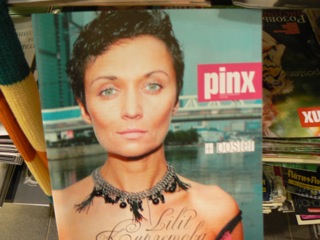
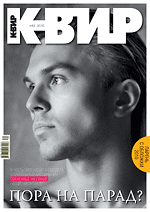 Although not on a main street, Queer sex shop is unusual in that it has a large blue plastic sign out front that’s readily visible—a bold move. Inside, it looks as familiar as any shop in London’s Soho with videos, magazines (one brand, it own), T-shirts, shorts, underwear (expensive: US$50 for sexy shorts), books, sex toys, no ‘performance enhancers’.
Although not on a main street, Queer sex shop is unusual in that it has a large blue plastic sign out front that’s readily visible—a bold move. Inside, it looks as familiar as any shop in London’s Soho with videos, magazines (one brand, it own), T-shirts, shorts, underwear (expensive: US$50 for sexy shorts), books, sex toys, no ‘performance enhancers’.
Pornography is technically illegal in Russia but there are numerous imported porno videos on the shelves at Queer. Offering such merchandise is dancing on the edge of social tolerance but Nikolai hinted that the shop offers sufficient ‘gifts’ to certain local people. On the way out I saw flyers for the recent ‘A Single Man‘ video (pirated? authorized?). I bought a copy of the latest ‘Queer’ magazine for US$4. This shop with it bright lights and colorful merchandise was the liveliest place we visited on our stroll.
(See another (2013) interview with Nicolai Baev at Gay City News.)
Gay Life in Russia
We walked and talked about gay life in modern Russia, which only started 21 years ago with the fall of the Soviet Union in 1989. Since then, there has been much or little progress, depending on how one measures. During the last decades of the Soviets, numerous furtive and short-lived groups, publications and individuals made efforts to gather a LGBT community but none succeeded for long. Such things were illegal and sporadic but as always there were furtive places that attracted gays, such as in front of the Bolshoi Ballet Theatre or certain parks at certain times.
Said Nikolai, “during Soviet times, Moscow’s size made it the safest home for underground gay nightlife, with certain bars and clubs serving as unofficial gay Moscow hotspots. Now that bars and clubs cater to gays without fear of reprisal, gay Moscow is getting louder and prouder. Homophobia is still present in Russian society, to be sure, but gay Moscow life is far more comfortable and accepted than ever.”
Today there are half a dozen lively and quiet LGBT places in Moscow but a visitor would never find most of them; they are literally underground, in renovated half-cellars where various ‘types’ gather regularly–youth, lesbians, bears, business types. Typically they are entered through a metal door in an unmarked entryway.
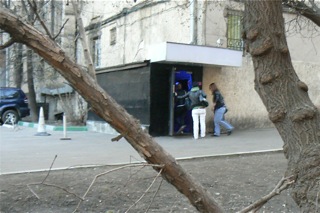 One was called 12-Volt, mainly a lesbian venue. As we passed by three women entered quickly and disappeared behind the door. (photo left) Nikolai said it was a rather small place with a small dance floor and a DJ. This cozy club, like others, has no street presence or any advertising that would attract unwanted attention.
One was called 12-Volt, mainly a lesbian venue. As we passed by three women entered quickly and disappeared behind the door. (photo left) Nikolai said it was a rather small place with a small dance floor and a DJ. This cozy club, like others, has no street presence or any advertising that would attract unwanted attention.
Things change quickly in this city. Nikolai took me to another anonymous bar but it was closed down. A third one was not open yet for the night.
Since Nikolai and I are not bar people and time was short we didn’t pursue other places but online there are numerous websites that list LGBT venues. The major ones in Moscow are Propaganda, Tsifri (Digits), New Age plus 3 saunas. That said, it’s difficult for a foreigner to get an accurate take on the immediate scene because many websites are not updated frequently and closed venues are still listed. The most accurate information is from a gay guide once you arrive in the city.
A cruise on the internet reveals the following venues but I cannot verify the information. Some sites have not been updated since 2002. The listings here do not include saunas; there are two or three, or four.
Gay.ru website lists these Moscow venues: Tsifri (Digits) bar/club, Elf Cafe, Body and Soul, New Age (Three Monkeys), Propaganda,
Associated Content website lists these places: Bar 119, 12-Volt, Samovolka (Absent Without Leave), New Age (Three Monkeys), Daria Moria (Gifts of the Sea), Cafe Stereo, Baza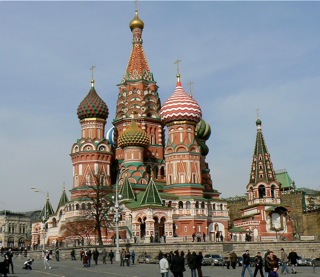
Way to Russia website lists these: Propaganda Pink Fly (website dead),
Gay Moscow.com website lists these: Shans, Three Monkeys, Central Station
Nightours.com website lists these: 911 Cafe, Elf Cafe, Body and Soul, Chubabar, Propaganda, Three Monkeys
Finally
Moscow has a reputation of being intolerant to ‘different’ people, not just gays but to foreigners who come to Moscow from Central Asia. There are beatings and murders of these immigrants. Gays usually only get punched around by skinheads and arrested by police when they mount a ‘manifestation’ such as Gay Pride.
Noted Nikolai, “We would rather be arrested than attacked.” So GayRussia.ru usually lets the media know where they will have a Pride activity knowing the police will find them–hopefully before the skinheads. It’s a cat-and-mouse game that happens every year with international activists arriving to support GayRussia.ru in their combat with homophobic authorities and street gangs.
Gay Russia is fragmented among three major organizations that prefer not to join hands in unity. But that strategy is sufficient for now because there is so much work to do to bring the ‘new’ Russia into the modern world of LGBT rights. Each of the three groups is working in the same direction by different means using different tactics: activism, conferences and monitoring, and social networking and entertainment venues. The country is huge, the task is enormous, the active gay community is very small—but hope is strong and the rest of the LGBT world is with them on the side of justice and equality.
A Note About HIV/AIDS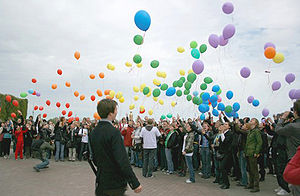
AIDS is a serious epidemic in Russia. During my visit, I did not encounter or talk to anyone involved in HIV/AIDS care and prevention. This I regret. For anyone interested, Lsted here are some useful websites that give an overview and specifics of HIV/AIDS work in Russia.
AVERT is an international HIV and AIDS charity, based in the UK.
HIV in Russia from About.com
HIV and Aids in Russia from The Body AIDS Resource
HIV Organizations in Russia
GayRussia.ru and HIV
HIV Programs in Russia and Yale University
USAID in Russia
Transatlantic Partners Against AIDS: “Russia has a well-developed HIV/AIDS infrastructure including the Federal AIDS Center (responsible for federal guidelines, normative direction, and epidemiology), seven interregional AIDS centers, 88 regional AIDS centers, and a growing number of municipal AIDS centers. AIDS centers provide HIV/AIDS prevention, testing and counseling, treatment, surveillance and laboratory monitoring…”
Also see: Gay Russia News and Reports
Also see: Russia Photo Galleries


